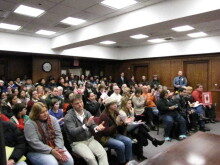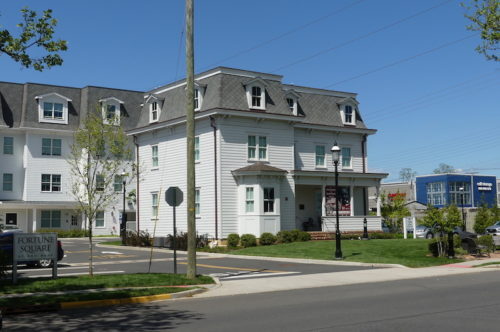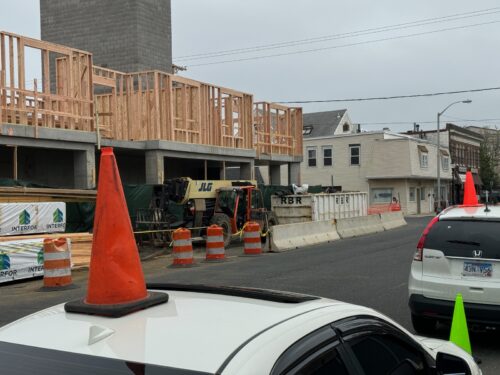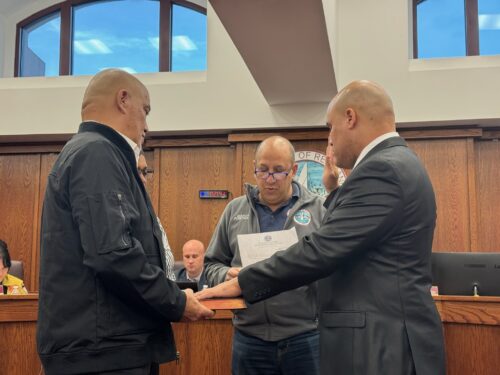
By JOHN T. WARD

After an estimated 200 parents, children, district employees and others marched in frigid weather from the middle school to borough hall, the council adopted a resolution asking the state Department to delay a decision on the charter school endeavor.
A video posted on YouTube Wednesday features Red Bank Middle School alumni reflecting on their experiences there. Below, the crowd overflowed the council chamber. (Click embiggen symbol above to enlarge)

“The turnout this evening is indicative of that it is an issue with rather important ramifications,” Menna said of thE proposal, which which would double charter school enrollment to 400 students over three years.
The resolution asks that the charter plan “not be approved at this time.” It also asks that the plan not be approved “unless and until… the state is willing to fully fund” the district school, which has been shorted by several millions of dollars owed it under state law in recent years.
The measure was directed to Education Commissioner David Hespe, who has sole authority to approve or reject the plan, and must do so by February 1. The charter school application to the education department was filed on December 1.
“No one is against the charter school as it now exists,” said Councilwoman Kathy Horgan, who read the resolution into the record. “But by expanding, there will be dire consequences” on the district, including the elimination of arts, music and sports programs as well as increases in class sizes, she said.
“We really need time to study this,” she said, which prompted several in the audience to shout, “no!” Horgan responded that “I think it’s only fair that we review what they want to do.”
Many in the audience had marched, with police aiding them at intersections, from the middle school, chanting “No way, we won’t pay.”
No one in the overflow audience spoke in favor of the expansion plan. A handful of speakers took to the microphone to implore that the council consider the impact they contend it would have on taxpayers and children.
Wayne Woolley, a parent of two district schoolchildren, predicted that if 100 students in the first round of 120 new charter seats came from the public schools, the district budget would increase by five percent, and $800,000 worth of programs would have to be cut. Over three years, that figure would climb to $2 million, “which would mean the loss of 25 teachers,” he said.
Superintendent Jared Rumage told the council that the groundswell of passion over the issue was “not anti-Red Bank Charter School. It’s not even anti-choice. It’s anti-expansion-at-this time.” He said an approval of the plan by Hespe would “devastate” the district and “water down” the charter school’s own accomplishments.
Marybeth Maida told the council that having two school systems in a town the size of Red Bank is “ridiculous.”
“We’re doing this backward,” said district board member Ben Forest. The charter school, he said, should withdraw its proposal and “come here and make the case why this is a great idea for all of us.”
A number of parents made impassioned pleas, including Maria Santamaria, who said immigrants who never had a chance to be educated in their home countries were now watching their children, including her fifth-grade son, perform at high levels and dream of going to Harvard.
“We need our kids going to college,” she said tearfully. “Please do something to help us.”
Named to the panel were:
• Barbara Boas, a retired school teacher and alternate member of the planning board.
• Jan Wouters, an attorney at the Toms River firm of Bathgate, Wegener & Wolfe, who represents school boards, including charter schools, Menna said.
• Judy DeHaven, a former journalist who’s now a vice president of corporate communications at CBS Corporation. She has two children in the district school and, with her husband, Wayne Woolley, has been a prominent opponent of the charter school expansion.
• Jesse Garrison, a retired public works supervisor and community activist who has served more than 25 years on the borough zoning board.
• Michael Stasi, who Menna said was “on the original panel that created the charter school.”
• Richard Angoski, an attorney who Menna said represents both charter and public schools.
• Jennifer Garcia, a parent who Menna said is “active in the business community.”
Some of them had not been notified of their appointments prior to the announcement, Menna said. Twenty-two people requested a seat at the table, “all of them extraordinarily well-qualified,” he said, adding that the panel was assembled in part based on ensuring representation of women, men, African-Americans, and proponents of both district and charter schools.
Also expected to participate in the panel’s closed-door discussions are Rumage; charter school Principal Meredith Pennotti; the business administrators of the district and charter schools; borough Chief Financial Officer Eugenia Poulos; and Horgan.
Here’s the charter school’s application to the DOE: RBCS Amendment Request Dec 2015





















